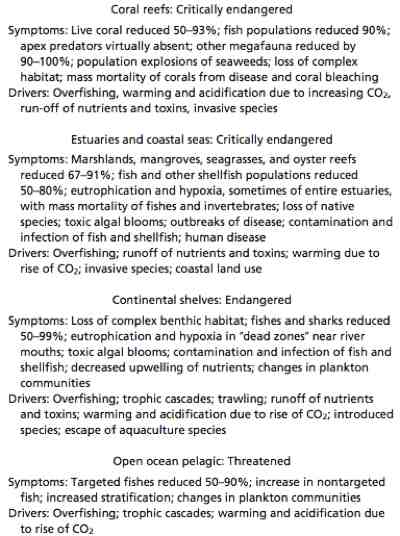
Let's face it: Our pristine oceans, as we've come to know them, aren't coming back. Besieged on all sides by overfishing, climate change, pollution and habitat destruction, the world's oceans are slowly but inevitably undergoing a long and painful transition -- one that could turn their once lush coral reefs and kelp forests into barren deserts. This chilling assessment, once considered a fringe view, has been brought into the mainstream of scientific discussion by the likes of Jeremy Jackson and Daniel Pauly, leading oceanographers whose groundbreaking research helped elucidate the links between human exploitation of the ocean's resources and its gradual decline.
In a disturbing new article published in the Proceedings of the National Academy of Sciences, Jackson predicts our actions, combined with the synergistic effects of climate change, are laying the groundwork for a mass extinction with unknown consequences for the human race and the planet:
Synergistic effects of habitat destruction, overfishing, introduced species, warming, acidification, toxins, and massive runoff of nutrients are transforming once complex ecosystems like coral reefs and kelp forests into monotonous level bottoms, transforming clear and productive coastal seas into anoxic dead zones, and transforming complex food webs topped by big animals into simplified, microbially dominated ecosystems with boom and bust cycles of toxic dinoflagellate blooms, jellyfish, and disease.
If this all sounds a bit overwrought to you, know this: Many of these dire predictions, which were first made by Jackson and his colleagues almost a decade ago (for which they were greeted with loud skepticism), have largely held water. A comprehensive review of coastal seas and estuaries worldwide has revealed that, of 80 species studied, 91 percent are severely depleted, 31 percent are rare, and 7 percent are extinct -- a scenario once dismissed as alarmist. When Boris Worm and Ransom Myers, two fisheries biologists, claimed 5 years ago that 90 percent of all of the world's large fisheries were exhausted, their calculations were widely berated as "fantasy" and "folly". A later study conducted by Ransom Myers and Peter Ward that examined the status of 19 oceanic fisheries species in the Central Tropical Pacific between the 1950s and 1990s determined that overall biomass had declined 89.7 percent -- and large predators had declined 90.3 percent.
Ocean acidification, a phenomenon I've described at length on several occasions, could wipe out all coral reefs within the next few decades -- radically altering the ocean's makeup and its biodiversity. A rapid increase in carbon dioxide emissions has already caused the oceans' pH to drop by 0.1 units, which may not sound like much if it weren't for the fact that corals, and many other essential marine organisms, have shells and skeletons made out of calcium carbonate (imagine dropping chalk into a bowl of weak acid, and you'll get the idea). As vital components of the carbon cycle and the ocean's CO2 storage capacity, even a minor drop could have devastating consequences.
The picture Jackson paints of a future ocean in crisis is, to say the least, frightening:
Failure to stop over fishing will push increasing numbers of species to the brink of extinction--perhaps irreversibly as for Newfoundland cod-- except for small, opportunistic species. Unrestrained runoff of nutrients and toxins, coupled with rising temperatures, will increase the size and abundance of dead zones and toxic blooms that may merge all along the continents. Even farmed seafood will be increasingly toxic and unfit for human consumption unless grown in isolation from the ocean. Outbreaks of disease will increase. Failure to cap and reduce emissions of CO2 and other greenhouse gases will increase ocean temperatures and intensify acidification. Warmer and lighter surface waters will inhibit vertical mixing of the ocean, eventually leading to hypoxia or anoxia below the thermocline as in the Black Sea. Biogeochemical cycles will be perturbed in uncertain ways as they have been in the past. Mass extinction of multicellular life will result in profound loss of animal and plant biodiversity, and microbes will reign supreme.

While he acknowledges that making long-term predictions is, at best, "a highly uncertain enterprise" and that his may appear extreme, it's hard to find fault with the specifics of his analysis. We're already seeing more, larger dead zones spreading across the ocean -- a consequence of, among other things, our record high use of fertilizers -- and an increasing number of coral reefs in poor or fair health.
So what can be done? Jackson proposes three potential solutions which, if combined, would go a long ways toward preventing the further degradation of our oceans: sustainable fisheries and aquaculture; taxing fertilizers and eliminating fertilizer and pesticide subsidies; and (of course) reducing greenhouse gas emissions.
Despite the overwhelmingly downbeat tone of his article, Jackson points to promising new research which suggests that local protection and conservation efforts can help coral reefs become more resistant and resilient to the effects of climate change. Not only that, but, as I've written about before, these local conservation efforts can also help alleviate poverty and boost the quality of life for the residents of impoverished communities. Developing a multidisciplinary, coordinated approach to ocean conservation will, of course, yield the most benefits over the long run and thus be necessary.
In the meantime, every little step will help.
